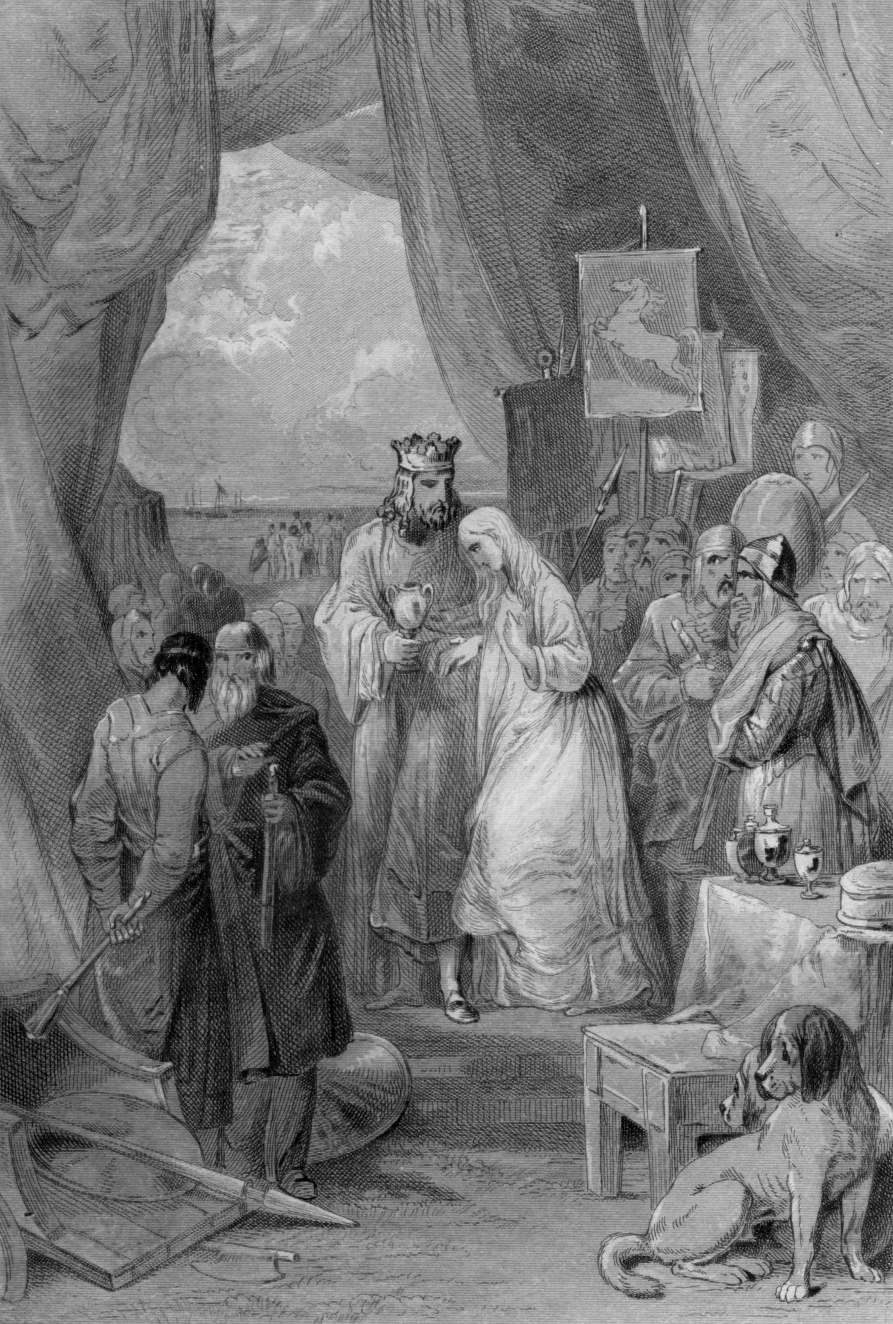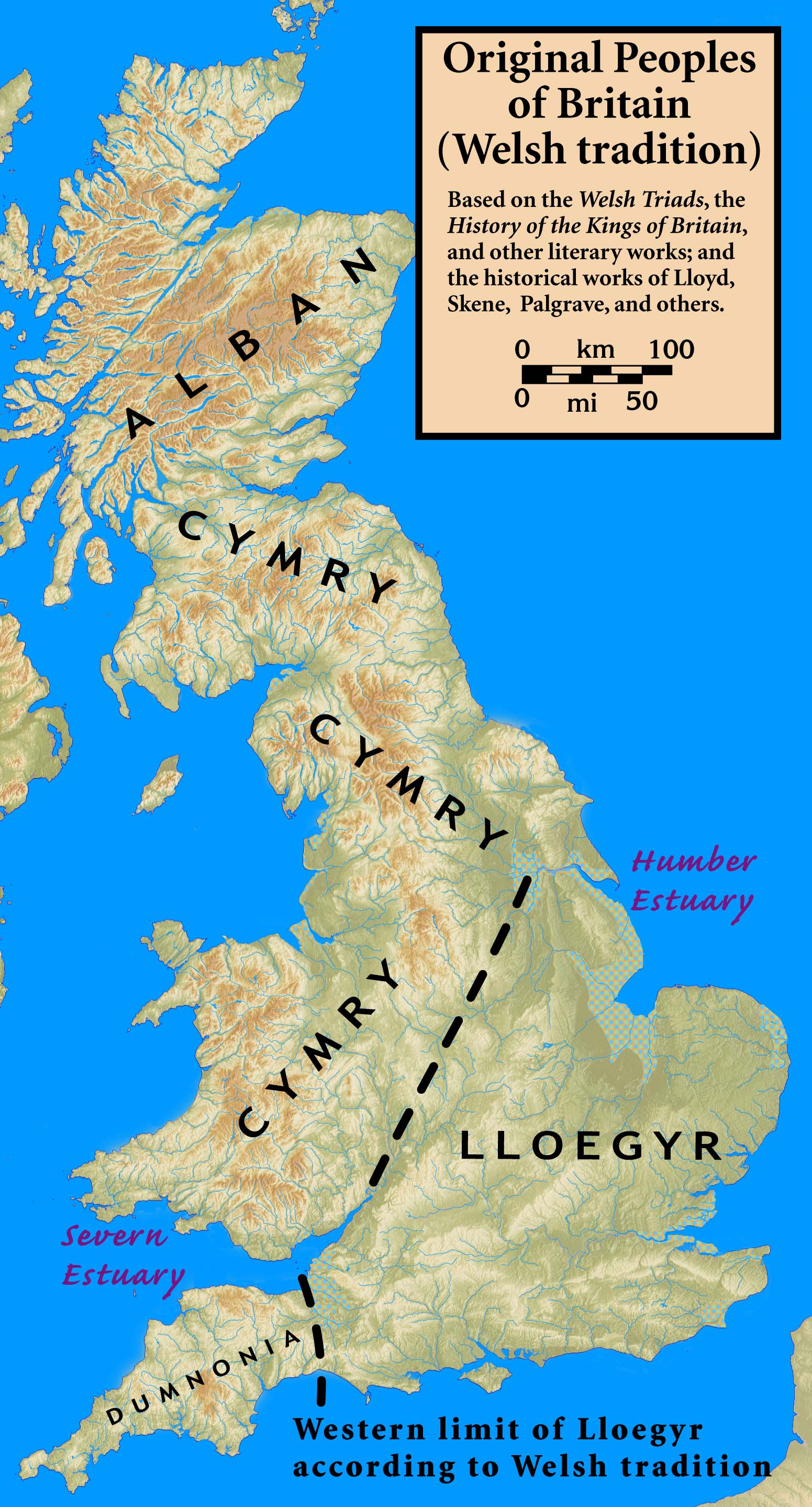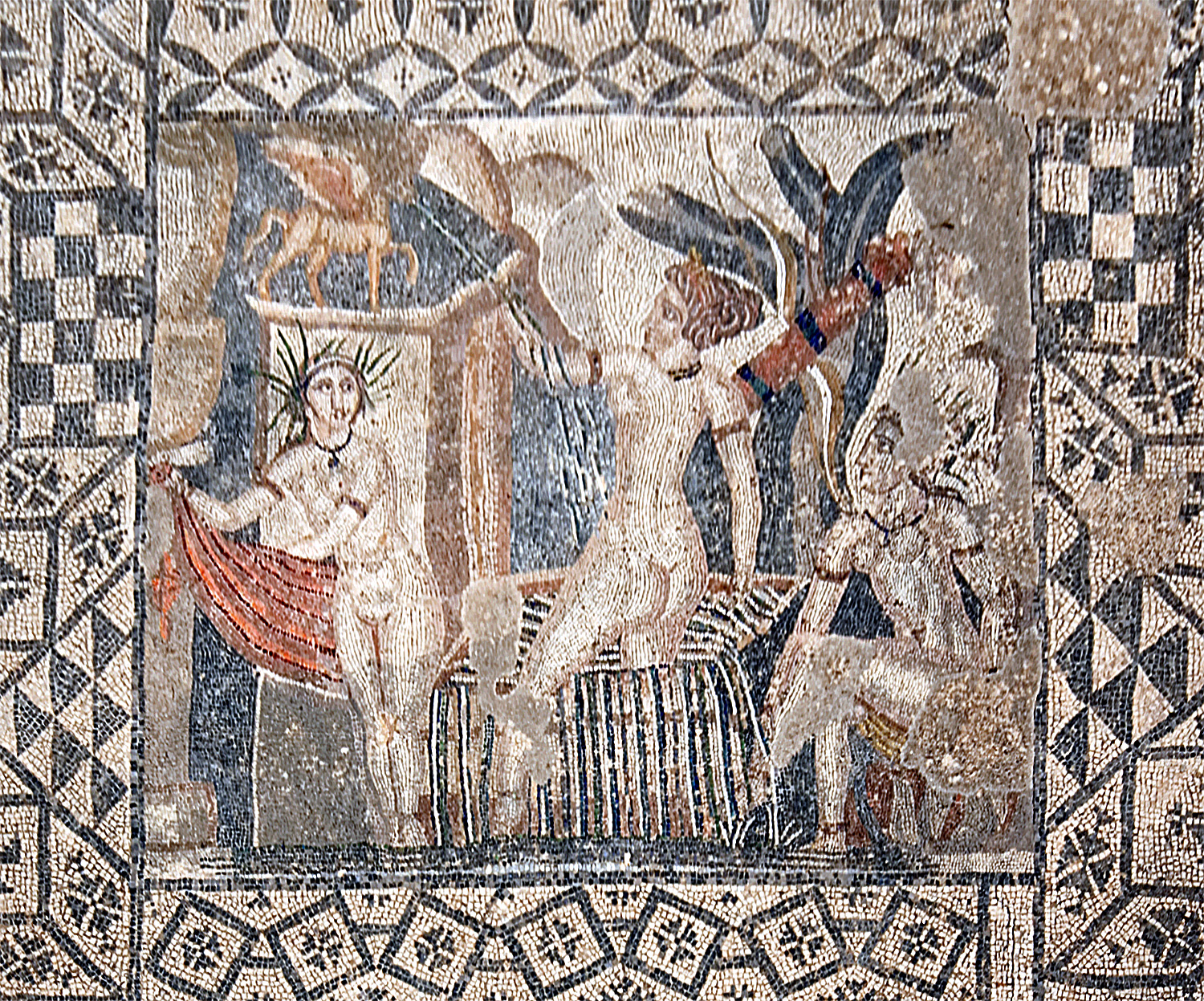|
Historia Regum Britanniæ
(''The History of the Kings of Britain''), originally called (''On the Deeds of the Britons''), is a fictitious account of British history, written around 1136 by Geoffrey of Monmouth. It chronicles the lives of the kings of the Britons over the course of two thousand years, beginning with the Trojans founding the British nation and continuing until the Anglo-Saxons assumed control of much of Britain around the 7th century. It is one of the central pieces of the Matter of Britain. Although taken as historical truth until the 16th century, it is now considered to have no value as history. When events described, such as Julius Caesar's invasions of Britain, can be corroborated from contemporary histories, Geoffrey's account can be seen to be wildly inaccurate. It remains, however, a valuable piece of medieval literature, which contains the earliest known version of the story of King Lear and his three daughters, and helped popularise the legend of King Arthur. Contents Geoff ... [...More Info...] [...Related Items...] OR: [Wikipedia] [Google] [Baidu] |
Vortigern
Vortigern (; , ; ; ; Old Breton: ''Gurdiern'', ''Gurthiern''; ; , , , etc.), also spelled Vortiger, Vortigan, Voertigern and Vortigen, was a 5th-century warlord in Sub-Roman Britain, Britain, known perhaps as a king of the Britons or at least connoted as such in the writings of Bede and Gildas. His existence is contested by scholars and information about him is obscure. He may have been the "superbus tyrannus" said to have invited Hengist and Horsa to aid him in fighting the Picts and the Scottish people, Scots, whereupon they revolted, killing his son in the process and forming the Kingdom of Kent. It is said that he took refuge in North Wales, and that his grave was in Dyfed or the Llŷn Peninsula. Gildas later denigrated Vortigern for his misjudgement and also blamed him for the loss of Britain. He is cited at the beginning of the genealogy of the early Kingdom of Powys, Kings of Powys. Medieval accounts Gildas The 6th-century cleric and historian Gildas wrote ''De Excidio ... [...More Info...] [...Related Items...] OR: [Wikipedia] [Google] [Baidu] |
Caesar's Invasions Of Britain
In the course of his Gallic Wars, Julius Caesar invaded Britain twice: in 55 and 54 BC. On the first occasion, Caesar took with him only two legions, and achieved little beyond a landing on the coast of Kent. The second invasion was more substantial, consisting of 800 ships, five legions and 2,000 cavalry. The force was so imposing that the Celtic Britons did not contest Caesar's landing, waiting instead until he began to move inland. Caesar eventually penetrated into Middlesex and crossed the Thames, forcing the British warlord Cassivellaunus to pay tribute to Rome and setting up Mandubracius of the Trinovantes as a client king. The Romans then returned to Gaul without conquering any territory. Caesar included accounts of both invasions in his '' Commentarii de Bello Gallico'', which contains the earliest surviving significant eyewitness descriptions of the island's people, culture and geography. This is effectively the start of the written history, or at least the proto ... [...More Info...] [...Related Items...] OR: [Wikipedia] [Google] [Baidu] |
Dunvallo Molmutius
Dyfnwal Moelmud ( Welsh for "Dyfnwal the Bald and Silent"; ; ) was accounted as an early king and lawmaker among the Welsh, credited with the codification of their standard units of measure. He also figures as a legendary king of the Britons in Geoffrey of Monmouth's pseudohistorical '' History of the Kings of the Britons''. History Only two known historical documents mention Dyfnwal. A tenth-century genealogy in the British Library (Harley MS 3859) identifies him as the grandson of Coel Hen, and ancestor of Morcant Bulc. A fifteenth-century genealogy in Jesus College, Oxford (MS 20) also identifies him in the same way. Legend In Geoffrey's account, Dyfnwal was the son of Cloten, the King of Cornwall, and he restored order after the "Civil War of the Five Kings". His family was a cadet branch of the dynasty of Brutus, the dominant line having ended with Porrex I before the civil war. The '' Book of Baglan'' expands on this by making Dyfnwal descend directly through ... [...More Info...] [...Related Items...] OR: [Wikipedia] [Google] [Baidu] |
Alba
''Alba'' ( , ) is the Scottish Gaelic name for Scotland. It is also, in English-language historiography, used to refer to the polity of Picts and Scots united in the ninth century as the Kingdom of Alba, until it developed into the Kingdom of Scotland of the late Middle Ages following the absorption of Strathclyde and English-speaking Lothian in the 12th century. It is cognate with the Irish term ' (gen. ', dat. ') and the Manx term ', the two other Goidelic Insular Celtic languages, as well as contemporary words used in Cornish (') and Welsh ('), both of which are Brythonic Insular Celtic languages. The third surviving Brythonic language, Breton, instead uses ', meaning 'country of the Scots'. In the past, these terms were names for Great Britain as a whole, related to the Brythonic name Albion. Etymology The term first appears in classical texts as ' or ' (in Ptolemy's writings in Greek), and later as ' in Latin documents. Historically, the term refers t ... [...More Info...] [...Related Items...] OR: [Wikipedia] [Google] [Baidu] |
Cambria
Cambria is a name for Wales, being the Latinised form of the Welsh name for the country, . The term was not in use during the Roman period (when Wales had not come into existence as a distinct entity) or the early medieval period. After the Anglo-Saxon settlement of much of Britain, a territorial distinction developed between the new Anglo-Saxon kingdoms (which would become England and Southern Scotland) and the remaining Celtic British kingdoms (which would become Wales and, before their absorption into England and Scotland, Cornwall to the south and Strathclyde or Hen Ogledd to the north). Latin being the primary language of scholarship in Western Christendom, medieval writers commonly used either the older term ''Britannia'', as the territory still inhabited by Britons, or ''Wallia'', a term derived from Old English, to refer to Wales. The term ''Cambria'' is first attested in Geoffrey of Monmouth in the 12th century as an alternative to both of these, since ''Britannia'' ... [...More Info...] [...Related Items...] OR: [Wikipedia] [Google] [Baidu] |
Lloegyr
Lloegyr is the medieval Welsh language, Welsh name for a region of Great Britain, Britain (''Prydain''). The exact borders are unknown, but some modern scholars hypothesize it ran south and east of a line extending from the Humber Estuary to the Severn Estuary, exclusive of Cornwall and Devon. The people of Lloegyr were called ''Lloegyrwys'' without distinction of ethnicity, the term applying to both Britons (Celtic people), Britons and Anglo-Saxons. The modern form of the word is Lloegr ( or ) and it has become generalised through the passage of time to become the Welsh word for "England" as a whole, and not restricted to its original, smaller extent. The word has been Anglicisation, anglicised and Latinisation (literature), Latinised into such forms as Logres, Logris, and Loegria, among others, and is perhaps most widely recognised as the name of King Arthur's realm in the body of literature known as the ''Matter of Britain''. The word is known to date from the 10th century o ... [...More Info...] [...Related Items...] OR: [Wikipedia] [Google] [Baidu] |
Totnes
Totnes ( or ) is a market town and civil parish at the head of the estuary of the River Dart in Devon, England, within the South Devon Area of Outstanding Natural Beauty. It is about west of Paignton, about west-southwest of Torquay and about east-northeast of Plymouth. It is the administrative centre of the South Hams District Council. Totnes has a long recorded history, dating back to 907, when its first castle was built. By the twelfth century it was already an important market town, and its former wealth and importance may be seen from the number of merchants' houses built in the sixteenth and seventeenth centuries. Today, the town has a sizeable alternative and New Age community, known as a place where one can live a Bohemianism, bohemian lifestyle, though has in recent times also gained a reputation as being a hotspot for Conspiracy theory, conspiracy theorists within the UK. The 2021 United Kingdom census, 2021 census recorded a population of 9,214, a 14% increase ... [...More Info...] [...Related Items...] OR: [Wikipedia] [Google] [Baidu] |
Diana (mythology)
Diana is a goddess in Religion in ancient Rome, Roman religion, primarily considered a patroness of the countryside and nature, hunters, wildlife, childbirth, crossroads, the night, and the Moon. She is Syncretism, equated with the Greek mythology, Greek goddess Artemis, and absorbed much of Artemis' mythology early in Roman history, including a birth on the island of Delos to parents Jupiter (mythology), Jupiter and Latona, and a twin brother, Apollo,''Larousse Desk Reference Encyclopedia'', The Book People, Haydock, 1995, p. 215. though she had Diana Nemorensis, an independent origin in Italy. Diana is considered a virgin goddess and protector of childbirth. Historically, Diana made up a triad with two other Roman deities: Egeria (mythology), Egeria the water nymph, her servant and assistant midwife; and Virbius, the woodland god. Diana is revered in modern Modern paganism, neopagan religions including Reconstructionist Roman religion, Roman neopaganism, Stregheria, and Wic ... [...More Info...] [...Related Items...] OR: [Wikipedia] [Google] [Baidu] |
Brutus Of Troy
Brutus, also called Brute of Troy, is a mythical British king. He is described as a legendary descendant of the Trojan hero Aeneas, known in medieval British legend as the eponymous founder and first king of Britain. This legend first appears in the ''Historia Brittonum'', an anonymous 9th-century historical compilation to which commentary was added by Nennius, but is best known from the account given by the 12th-century chronicler Geoffrey of Monmouth in his . ''Historia Brittonum'' Some have suggested that attributing the origin of 'Britain' to the Latin 'Brutus' may be ultimately derived from Isidore of Seville's popular 7th-century work ''Etymologiae'' (c. 560–636), in which it was speculated that the name of Britain comes from ''bruti'', on the basis that the Britons were, in the eyes of that author, brutes, or savages. A more detailed story, set before the foundation of Rome, follows, in which Brutus is the grandson or great grandson of Aeneas – a legend that was perh ... [...More Info...] [...Related Items...] OR: [Wikipedia] [Google] [Baidu] |
Trojan War
The Trojan War was a legendary conflict in Greek mythology that took place around the twelfth or thirteenth century BC. The war was waged by the Achaeans (Homer), Achaeans (Ancient Greece, Greeks) against the city of Troy after Paris (mythology), Paris of Troy took Helen of Troy, Helen from her husband Menelaus, king of Sparta. The war is one of the most important events in Greek mythology, and it has been Epic Cycle, narrated through many works of ancient Greek literature, Greek literature, most notably Homer's ''Iliad''. The core of the ''Iliad'' (Books II – XXIII) describes a period of four days and two nights in the tenth year of the decade-long siege of Troy; the ''Odyssey'' describes the journey home of Odysseus, one of the war's heroes. Other parts of the war are described in a Epic Cycle, cycle of epic poems, which have survived through fragments. Episodes from the war provided material for Greek tragedy and other works of Greek literature, and for Latin literature, ... [...More Info...] [...Related Items...] OR: [Wikipedia] [Google] [Baidu] |
Aeneid
The ''Aeneid'' ( ; or ) is a Latin Epic poetry, epic poem that tells the legendary story of Aeneas, a Troy, Trojan who fled the Trojan War#Sack of Troy, fall of Troy and travelled to Italy, where he became the ancestor of the Ancient Rome, Romans. Written by the Roman poet Virgil between 29 and 19 BC, the ''Aeneid'' comprises 9,896 lines in dactylic hexameter. The first six of the poem's twelve books tell the story of Aeneas' wanderings from Troy to Italy, and the poem's second half tells of the Trojans' ultimately victorious war upon the Latins (Italic tribe), Latins, under whose name Aeneas and his Trojan followers are destined to be subsumed. The hero Aeneas was already known to Greco-Roman legend and myth, having been a character in the ''Iliad''. Virgil took the disconnected tales of Aeneas' wanderings, his vague association with the foundation of Ancient Rome, Rome and his description as a personage of no fixed characteristics other than a scrupulous ''pietas'', ... [...More Info...] [...Related Items...] OR: [Wikipedia] [Google] [Baidu] |
Aeneas
In Greco-Roman mythology, Aeneas ( , ; from ) was a Troy, Trojan hero, the son of the Trojan prince Anchises and the Greek goddess Aphrodite (equivalent to the Roman Venus (mythology), Venus). His father was a first cousin of King Priam of Troy (both being grandsons of Ilus (son of Tros), Ilus, founder of Troy), making Aeneas a second cousin to Priam's List of children of Priam, children (such as Hector and Paris (mythology), Paris). He is a minor character in Greek mythology and is mentioned in Homer's ''Iliad''. Aeneas receives full treatment in Roman mythology, most extensively in Virgil's ''Aeneid'', where he is cast as an ancestor of Romulus and Remus. He became the first true hero of Rome. Snorri Sturluson identifies him with the Norse god Víðarr of the Æsir.The Prose Edda of Snorri Sturlson Translated by Arthur Gilchrist Brodeur [1916] Prologue II at Internet Sacred Texts Archive. Accessed 11/14/17 Etymology Aeneas is the Romanization of Greek, Romanization of the h ... [...More Info...] [...Related Items...] OR: [Wikipedia] [Google] [Baidu] |







